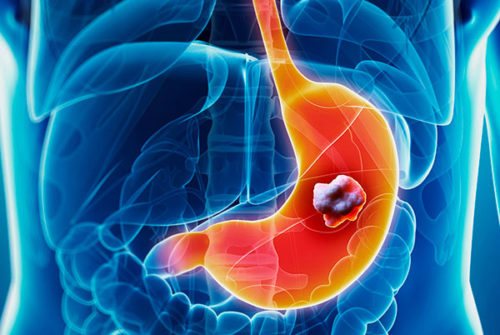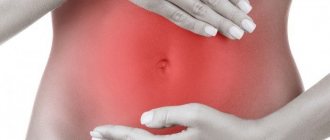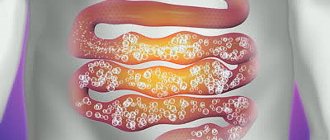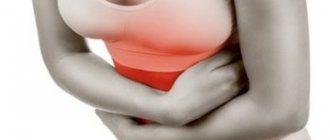Formation and mechanism of action of mucin
Mucus, also called mucin, is a thick, gel-like substance produced by cells in the stomach. This substance has a complex composition, which contains electrolytes, plasma and blood components, polysaccharides, and microorganisms.
The main function of mucus is to protect tissues from the negative effects of hydrochloric acid, medications, and the mechanical influence of food.
Mucin is produced through mucocytes. In a healthy state, a layer is formed in the stomach, the thickness of which is 1.5 mm. Due to the reaction of mucin with bicarbonate, the mucous membrane can resist the effects of acids. Due to this, a mucosobicarbonate barrier is formed.
What does the formation of mucus in the stomach indicate?
Mucus in the stomach usually indicates atrophic damage to the organ. Atrophy is the irreversible death of glands, and instead of complex epithelial cells, primitive mucocytes appear.
A special gel is released through them, but in itself it is not harmful. The problem is a deficiency in the secretion of breaking down components. In addition, mucin is often produced in the case of rigid or hypertrophic gastritis.
Why is excess mucin dangerous?
When excess mucus is produced in the stomach, complex processes begin that lead to the formation of peptic ulcers. They penetrate quite deeply into the walls of the organ. This causes minor discomfort. In addition, pain, vomiting, and cramps in the abdominal area may appear.
Subsequently, hypertrophy of the mucous membrane occurs, gastritis with an increase or decrease in acidity, and ulcerative lesions may develop. If these diseases are not treated, stomach cancer may develop.
If there is a deficiency of mucus in the stomach, this also leads to negative consequences. In this case, mucin cannot protect the mucosa, and it is damaged by hydrochloric acid or food. Subsequently, the formation of stomach cancer may also occur.
To prevent negative consequences, at the first symptoms of discomfort, a person should undergo a detailed examination.
Symptoms of esophagitis
It is quite difficult to diagnose esophagitis as an independent disease and get rid of mucus in the esophagus, because the symptoms are similar to diseases of the ENT organs and the cardiovascular system. In the first stages, the disease occurs without visible signs. As it progresses, the symptoms become pronounced, but not always unambiguous. GERD can be determined by the following signs:
- Bloating due to increased gas production;
- The appearance of heartburn after eating;
- Feeling of burning and pain in the chest;
- Sensation of a mucous lump in the throat;
- Mucus in the esophagus makes it difficult to swallow;
- Dry cough;
- Expectoration of mucus in the throat;
- Belching with an unpleasant odor;
- Poor passage of food through the esophagus.
The doctor must have considerable experience to make a correct diagnosis and know how to remove sputum, as well as the diseases associated with it. The more mucus appears in the esophagus and pharynx, the brighter the symptoms become. Ignoring it leads to pathological processes and blocking the flow of nutrients into the body. They simply cannot be absorbed by the villi of the stomach due to the thick layer of mucin. As a result, the patient begins to suffer from pain, which indicates the appearance of gastritis or the initial stage of a peptic ulcer.

Heartburn and belching are typical manifestations of esophagitis
Treatment methods
All cleansing methods provoke mucus secretion. General recommendations include the following:
- eat plenty of fruits and vegetables;
- minimize the consumption of harmful foods;
- eat as many raw foods as possible.
One of the most effective methods is complete fasting, which is carried out once a week for 1.5 days. After completing the diet, the first meal should consist of fruits and juices. They perfectly dissolve mucous secretions, and with the help of fiber this secretion is removed from the body. You can start with 24 hours, after which the fasting period can be extended to 36 hours per week. You can also fast for 3 days in a row for a month.
During the cleansing period, it is also useful to drink water with lemon juice. You can drink up to 3 liters of this liquid per day. In addition, the following means help remove mucus:
- Black pepper. Mucus can be neutralized with spicy or bitter foods. Therefore, before dinner you should consume 1 teaspoon of black pepper. It must be washed down with water. In this case, you cannot chew the peas. This procedure is performed every 3 days for 3 weeks. Then you should definitely stop for 3 months. If you have pathologies of the stomach or intestines, this technique is not recommended.
- Ginger. This warming agent also has a positive effect on the removal of mucus from the body. You need to chop the root, take 1 teaspoon and pour 0.5 liters of boiling water. Take the infusion warm throughout the day, adding honey and lemon.
To clear the stomach of mucus, you should include foods with coarse plant fibers in your diet. An enema is considered an excellent method of cleansing. To do this you need to take warm boiled water. Chamomile infusion is also great. The water temperature should be 36.6 degrees.
Instead of an enema, you can use a mild herbal laxative. However, you should not eat food in the evening.
An excellent method for removing mucus is lemon juice, which must be squeezed out of 5 fruits, and 150 g of chopped horseradish. These components need to be mixed and drunk 1 teaspoon in the mornings and evenings. The mixture should be washed down with herbal infusion. Carrot juice is also suitable for this purpose.
In the arsenal of traditional medicine there is a method of removing mucus by vomiting. To do this, dissolve 1 tablespoon of salt in 1 liter of water. After this, the solution is drunk and vomiting is induced. It is recommended to perform the procedure on an empty stomach. After several approaches, the water will acquire a transparent consistency.
In addition, there are recipes that are aimed at irritating the mucous membrane. These include plant decoctions and the use of hot spices. However, such methods can only aggravate the disease rather than alleviate the condition. Consumption of increased volumes of fluid provokes an increase in the load on the heart and blood vessels, but at the same time helps to reduce the amount of mucus. Therefore, it is worth considering that this technique is not suitable for people with hypertension and kidney disease.
Diet
Treatment without changing dietary principles is practically useless when it comes to stomach problems. It is important to plan meals so that no more than 4 hours pass between them. Foods like hamburgers or French fries are absolutely useless, only harmful and contribute to obesity. Therefore, with the first signs of gastritis, you should give up the habit of eating street food.
Let's get back to the main thing. What should you remove from your diet?
- Milk porridge in the morning.
- Potatoes - no matter how cooked, any potato dishes contain a lot of starch and increase mucus.
- All flour dishes, especially baked goods.
- Alcohol and coffee. They strongly irritate the mucous membranes and cause a protective reaction in the body.
- Fried, smoked, fatty foods.
Useful products, that is, those that reduce the mucin layer, are:
- millet, barley and dietary buckwheat;
- vegetables - cauliflower, carrots, asparagus, beets, celery.
Vegetables contain fiber, so they are digested properly and quickly. In the diet, instead of animal fats, it is better to use raw vegetable fats - olive, flaxseed, sunflower oils. It is useful to introduce nuts and seeds into your daily diet.
Excess mucus in the stomach can be eliminated naturally, without drugs, if you start eating raw vegetables in the morning, get by with one piece of fish during the day, and eat boiled vegetable dishes in the evenings.
Along with medication and folk treatment, strict adherence to diet is of decisive importance in the fight against the development of hypersecretion syndrome. An individual daily diet is formed by a gastroenterologist based on taking an anamnesis and conducting a series of diagnostic tests. However, there is a list of general principles by following which you can avoid increased production of hydrochloric acid and the destructive effects of digestive secretions on the walls of the stomach.
To prevent the formation of unpleasant symptoms, adhere to the following rules:
- Include a balanced amount of foods rich in fats, proteins and carbohydrates in your diet;
- Place the main emphasis on eating boiled and steamed dishes;
- Avoid consuming excessively fatty and spicy foods, all kinds of marinades, pickles, canned food;
- Fast foods are subject to the strictest ban;
- Drinking alcohol, strong coffee, and soda is an undesirable solution.
As for permitted products that do not contribute to increased secretion of hydrochloric acid, it is worth noting light cream soups. Slightly stale, dried bread may be consumed. A good solution would be to include well-cooked lean porridges, steamed omelettes, and boiled eggs in your daily diet. Permissible, safe drinks include compotes made from non-acidic berries and fruits, and weak tea.
Preventive measures
To prevent such problems, you should definitely eat rationally. Every person must remember that food should be a source of energy. Consumption of junk food provokes the appearance of excess weight and the development of pathologies of the digestive system.
Drinking alcoholic beverages poses a danger to the stomach, liver and other organs. It is worth considering that the systematic use of alcohol provokes destruction of the gastric mucosa. As a result, pathologies such as gastritis and duodenitis appear. With an ulcerative lesion, drinking alcohol can even provoke perforation.
Mucus in the stomach can lead to the development of dangerous diseases. To cope with this pathology, you need to promptly consult a doctor who will select adequate therapy and help improve the person’s condition. In addition, it is quite possible to use folk remedies, but before using them it is better to consult a doctor.
RepostTweet
Causes of fluid accumulation
An excessive amount of fluid in the gastric cavity indicates that not only the secretory function of the organ is impaired, but also the functioning of other systems. Excess water in the stomach can vary. Pathologies are classified according to a number of characteristics:
- By the amount of liquid: a slight excess of the norm;
- moderate accumulation;
- significant.
- sterile;
- treatable;
If the accumulation of fluid in the abdomen occurs repeatedly, it becomes stable and does not respond to conservative therapy.
The causes of the pathology are:

Pathology occurs against the background of stomach cancer.
- stomach and ovarian cancer;
- liver cirrhosis in the final stage;
- general stagnation of blood in the body, provoked by cardiac pathologies;
- pathologies of internal organs in a child obtained during intrauterine development;
- tuberculosis;
- alcoholic hepatitis;
- renal failure;
- acute dilatation of the stomach;
- poor nutrition.











